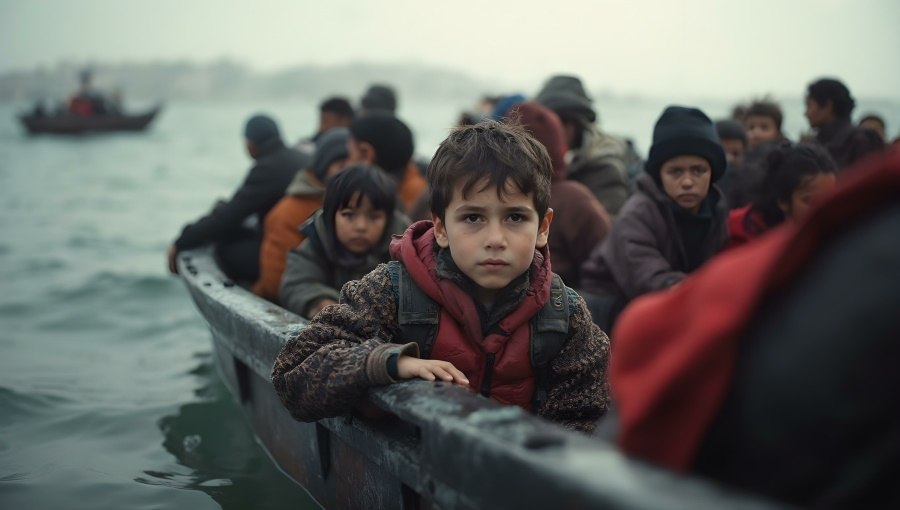The UN at 75: JCU Welcomes Robert Bruce Adolph
The Guarini Institute for Public Affairs welcomed retired U.S. Army Special Forces lieutenant colonel and former UN Chief Security Advisor Robert Bruce Adolph, for a talk entitled “The UN at 75: Aspiration and Reality” on February 18, 2020. Adolph worked at the UN for 20 years and was assigned to four peacekeeping operations. He was twice fired and twice promoted by the UN, and holds the record for having been the only senior security professional in history to be personally relieved of duty by the Secretary-General.
Sierra Leone
Adolph was first stationed in Sierra Leone as Chief Security Officer of the peacekeeping mission in the fall of 1999. The United Nations Mission in Sierra Leone (UNSAMIL) was a peacekeeping operation with the aim of enforcing a peace treaty introduced to end the country’s civil war (1991-2002). The conflict began in 1991 after the Revolutionary United Front (RUF) attempted to remove President Joseph Momoh from power. The illicit trade in the country’s alluvial diamonds, better known as conflict or blood diamonds, played an important role in financing the war. A large part of the diamond fields had been ceded to the RUF as part of the UN-brokered Lomé Peace Agreement (July 1999).
Soon after Adolph’s arrival, RUF forces began threatening to invade the country’s capital, Freetown. The UN had assigned troops from Sub-Saharan African countries, Jordan, and India to the peacekeeping mission. However, Adolph noted that there were two critical issues with the armed forces coming from West African countries. First, he suspected that they were falling short of their paid-for numbers of troops. The UN pays various nations millions of dollars to provide their soldiers for peacekeeping missions. Adolph argued that in this case the senior officers from the countries in question were suspected with sending fewer troops so as to pocket the difference. The missing men became known as “ghost soldiers.”
The second issue discovered by Adolph was that some West African nations had sent non-combat personnel under the guise of infantry battalions. He cited an incident in which 500 of these non-combat ready troops were forced to surrender to a 12-man strong RUF checkpoint. Overall these weak links in the UN peacekeeping force made the defense of Freetown untenable. The RUF invasion was only halted once British forces captured the city’s international airport and pushed back the enemy combatants.
Throughout his deployment in Sierra Leone, Adolph was also confronted with a troubling allegation. He was informed by a UN staff member that the head of the mission was involved in the trade of conflict diamonds. Adolph reported this matter to the UN Headquarters in New York asking for instructions. He was instructed to “tell nobody.”
Yemen
After only 9 months on the job, in July of 2000, Adolph was reassigned to the UN Headquarters in Sana’a, Yemen, as Field Security Officer. He was sent to the country’s Somali refugee camp run by United Nations High Commissioner for Refugees (UNHCR) where further evidence of endemic corruption became apparent. Adolph noticed that the number of food rations being allocated to the camp under the supervision of the World Food Programme (WFP) far exceeded the number of refugees that were supposedly being fed. Suspecting that the surplus was being sold locally for profit, he reported the issue to the head of the WFP and appropriate action was subsequently taken.
Iraq
After 2 ½ years in Yemen, Adolph was reassigned as the UN Security Chief for Iraq in the wake of the US invasion in March of 2003. A few months prior, Saddam Hussein had freed all detainees held in Iraqi prisons. With no functioning law enforcement or emergency services, the rule of law was effectively absent from Baghdad. For these reasons, Adolph had advised against entering Iraq at that time. That advice, as with many more of his security recommendations, were discounted by senior UN management in both Baghdad and New York. The UN Headquarters in Iraq was set up in the Canal Hotel. On August 19, 2003, a jihadist suicide bomber drove a flatbed truck into the hotel and detonated 2,000 pounds of explosives. 22 people were killed, including the United Nations’ Special Representative in Iraq, Sérgio Vieira de Mello. Adolph and his wife were among the 150 people to be severely wounded by the blast.
In the aftermath of the attack, Adolph was asked to testify 9 times in New York before an investigating panel appointed by the Secretary-General. He was falsely accused of negligence in the deaths and wounding of his colleagues in Baghdad, and personally relieved of duty by the Secretary-General. His testimony, along with the documents he provided the panel were declared “UN Confidential.” Yet, the nature of Adolph’s employment contract entitled him to have his case adjudicated by the United Nations Development Programme (UNDP), beyond the influence of the Secretary-General. Adolph was acquitted on all charges and reinstated without prejudice to his former rank and position.
Adolph points to one last case of major misappropriation of UN funds: the Iraqi Oil-for-Food Programme. This UN-administered program was designed to alleviate the suffering of the Iraqi people between the first and second Gulf Wars. Yet a lot of the money that went through the program was siphoned off by the Saddam regime to the benefit of the leader’s family, loyal subordinates, as well as complicit businessmen and politicians in Europe and Russia, and possibly UN officials. The program was exposed as the most corrupt in the history of the United Nations. After being indicted by a US prosecutor, the UN Executive Director of the program escaped to his home country of Cyprus where he could not be extradited for “financial crimes.” He currently faces an INTERPOL warrant for his arrest.
A final thought
Despite his troubled history with the international organization, Adolph stressed how vital the United Nations are to the wellbeing of millions of people around the world. Millions of destitute people are fed and cared for by the WFP and UNICEF. Peacekeeping efforts, when well supported, can save hundreds of thousands from the horrors of war. He also acknowledged that when providing aid to certain developing countries, bribery and misappropriation of UN funds are inevitable. Therefore, as Adolph concluded: “The UN is imperfect because we are. We dare not permit the unrealistic desire for perfection to become the enemy of the good. However, we must do better!”
(Marco Rampoldi)






